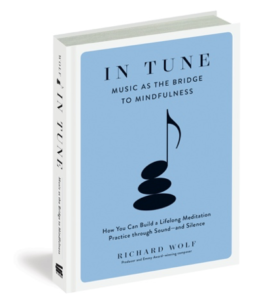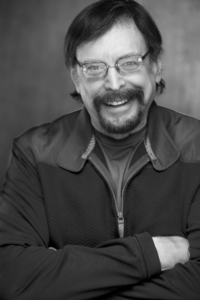Musicians, the good ones, always have a spiritual quality. It comes across in their ability to reach a higher plane through notes and melodies, connecting people across hemispheres through song. But what happens when the music stops? Can this ability be redirected toward genuine spiritual action? Emmy Award-winning composer and multi-platinum-selling music producer Richard Wolf, for one, thinks there’s a connection. The author of In Tune: Music as the Bridge to Mindfulness, Wolf recently spoke with WellWell about music’s influence on meditation and the junction between their practices and conclusions.
How is the process of learning an instrument and learning to meditate similarly?
It’s finding the time, and having the patience to sit and trust the instructions that will guide you. In both cases, if you lose concentration, if you lose focus, you can’t despair, that’s part of the process. If you can manage expectations to the point where you are satisfied sitting and developing a skill patiently, you will be successful.
In your book, you mention that as a teenager you attempted meditation and you were unsuccessful. What led to your eventual success with it?
It was something that I felt I needed to do in order to continue living because I had a really bad panic attack, which I thought was a heart attack. It was very frightening and uncomfortable. When your heart is racing and pounding against your chest like it wants to burst out into the world, it’s not a pleasant feeling that you want to relive.
I can imagine. What lead you to give meditation another shot?
Afterward, I went to a specialist, an anxiety specialist at UCLA, he prescribed 20 minutes of meditation. 10 minutes at night, 10 minutes in the morning and I thought, “Well if my medication is going to be meditation, I better really figure out how to do this.” And so I really got the message that “Don’t despair if you lose focus if you lose concentration. Just bring your attention back to your object of focus.” Then I just dived into the whole culture of Zen.
And do you think that helped your ability as a musician and a composer?
I wouldn’t say it necessarily made me a better musician, not in the traditional sense. It makes your life better and you a better version of yourself. Like Herbie Hancock says, “First you’re a human being, then you’re a musician.” So, first, you have to be able to cope with your life for this and live with yourself and the challenges you face, as a musician and as a person. You are then gifted with the peace and the space to create music more freely.
What is your opinion on the recent surge of meditation apps like Headspace and Insight Timer? Would you say that they have equal meditation music benefits in comparison to how people would learn to meditate through traditional means?
There’s a comedian, Aparna Nancherla, who jokes that “Using a phone to meditate is like asking your drug dealer for tips on how to get clean.” Look, it works for a lot of people so I can’t argue with the method. However, I come from a background where that’s instinctively against the intuition of mediation. But people need guidance, especially at the beginning so one way or another it’s good.
So, it’s more about the user than the apps themselves?
Ultimately, you have to be your own teacher. Ultimately, you have to be able to practice and improvise spontaneously and do things on your own without being told what to do. But as far as getting into the practice, the apps have been very successful with people and I can’t argue with that.
Do musicians have an easier time developing the ability to meditate?
I would say that musicians have an edge because they have experience in using dedication and discipline to hone a skill. They know that practice improves performance. Musicians know how the body and mind can coordinate perfectly with one another towards effortless harmony – they’ve had the experience of transcending the self. Like Bob Dylan says, “I don’t write the songs, the songs write me.”
And would you say the benefits of being in tune with the musical instrument, playing and being focused, are they the same as meditating in itself or do they each provide their own specific benefits?
The foundation of meditation is concentration. Concentration is the anchor, the foundation of the building. Once you have that skill, you can apply it to moment-to-moment awareness, natural awareness, pure awareness etc. It’s also a crucial aspect of being a musician. Both require undistracted, unfragmented attention for peak performance.
What’s the biggest similarity?
Everyone spends solitary time with their instruments when practicing – even when you’re in bands and orchestras etc., you are spending this intimate time alone with your instrument. With meditation it’s the same thing, it’s you spending intimate time with your mind.
 About Richard Wolf
About Richard Wolf
Richard Wolf is an Emmy Award–winning composer, multi-platinum-selling music producer, and professor at the University of Southern California’s Thornton School of Music, where he teaches ever-popular classes on music and mindfulness. As a producer/remixer/songwriter/composer, Wolf worked on projects with Prince, Bell Biv DeVoe, Freddie Mercury, MCLyte, and Coolio, and has been contributing to the soundtracks for hundreds of films and television programs, including twelve seasons of the worldwide hit NCIS. He started practicing Zen meditation when he was a teenager.
Learn More
https://twitter.com/wolfintune












